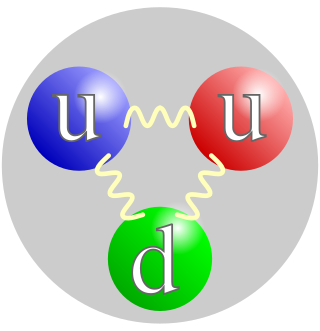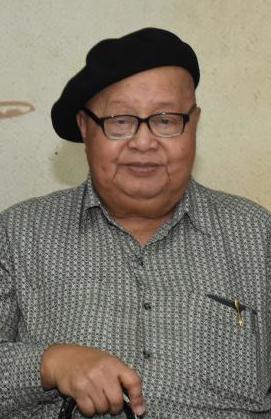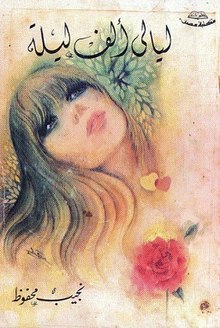
Muonium is an exotic atom made up of an antimuon and an electron, which was discovered in 1960 by Vernon W. Hughes and is given the chemical symbol Mu. During the muon's 2.2 µs lifetime, muonium can undergo chemical reactions. Because, like a proton, the antimuon's mass is vastly larger than that of the electron, muonium is more similar to atomic hydrogen than positronium. Its Bohr radius and ionization energy are within 0.5% of hydrogen, deuterium, and tritium, and thus it can usefully be considered as an exotic light isotope of hydrogen.

Naguib Mahfouz Abdelaziz Ibrahim Ahmed Al-Basha was an Egyptian writer who won the 1988 Nobel Prize in Literature. Mahfouz is regarded as one of the first contemporary writers in Arabic literature, along with Taha Hussein, to explore themes of existentialism. He is the only Egyptian to win the Nobel Prize in Literature. He published 35 novels, over 350 short stories, 26 screenplays, hundreds of op-ed columns for Egyptian newspapers, and seven plays over a 70-year career, from the 1930s until 2004. All of his novels take place in Egypt, and always mentions the lane, which equals the world. His most famous works include The Cairo Trilogy and Children of Gebelawi. Many of Mahfouz's works have been made into Egyptian and foreign films; no Arab writer exceeds Mahfouz in number of works that have been adapted for cinema and television. While Mahfouz's literature is classified as realist literature, existential themes appear in it.

A quark is a type of elementary particle and a fundamental constituent of matter. Quarks combine to form composite particles called hadrons, the most stable of which are protons and neutrons, the components of atomic nuclei. All commonly observable matter is composed of up quarks, down quarks and electrons. Owing to a phenomenon known as color confinement, quarks are never found in isolation; they can be found only within hadrons, which include baryons and mesons, or in quark–gluon plasmas. For this reason, much of what is known about quarks has been drawn from observations of hadrons.

A short story is a piece of prose fiction that can typically be read in a single sitting and focuses on a self-contained incident or series of linked incidents, with the intent of evoking a single effect or mood. The short story is one of the oldest types of literature and has existed in the form of legends, mythic tales, folk tales, fairy tales, tall tales, fables and anecdotes in various ancient communities around the world. The modern short story developed in the early 19th century.

Giorgos or George Seferis, the pen name of Georgios Seferiadis, was a Greek poet and diplomat. He was one of the most important Greek poets of the 20th century, and a Nobel laureate.

Yang Chen-Ning or Chen-Ning Yang, also known as C. N. Yang or by the English name Frank Yang, is a Chinese theoretical physicist who made significant contributions to statistical mechanics, integrable systems, gauge theory, and both particle physics and condensed matter physics. He and Tsung-Dao Lee received the 1957 Nobel Prize in Physics for their work on parity non-conservation of weak interaction. The two proposed that one of the basic quantum-mechanics laws, the conservation of parity, is violated in the so-called weak nuclear reactions, those nuclear processes that result in the emission of beta or alpha particles. Yang is also well known for his collaboration with Robert Mills in developing non-abelian gauge theory, widely known as the Yang–Mills theory.

Wolfgang Paul was a German physicist, who co-developed the non-magnetic quadrupole mass filter which laid the foundation for what is now called an ion trap. He shared one-half of the Nobel Prize in Physics in 1989 for this work with Hans Georg Dehmelt; the other half of the Prize in that year was awarded to Norman Foster Ramsey, Jr.

Kenichi Fukui was a Japanese chemist, known as the first person of East Asian ancestry to be awarded the Nobel Prize in Chemistry.
A plot twist is a literary technique that introduces a radical change in the direction or expected outcome of the plot in a work of fiction. When it happens near the end of a story, it is known as a twist or surprise ending. It may change the audience's perception of the preceding events, or introduce a new conflict that places it in a different context. A plot twist may be foreshadowed, to prepare the audience to accept it, but it usually comes with some element of surprise. There are various methods used to execute a plot twist, such as withholding information from the audience, or misleading them with ambiguous or false information. Not every plot has a twist, but some have multiple lesser ones, and some are defined by a single major twist.

Julius Wagner-Jauregg was an Austrian physician, who won the Nobel Prize in Physiology or Medicine in 1927, and is the first psychiatrist to have done so. His Nobel award was "for his discovery of the therapeutic value of malaria inoculation in the treatment of dementia paralytica".

Alan Jay Heeger is an American physicist, academic and Nobel Prize laureate in chemistry.

Betsy Devine is an American author, journalist, and blogger, with published works including Longing for the Harmonies (1988), an appreciation of modern physics with Nobel laureate Frank Wilczek, and of Absolute Zero Gravity (1993), a collection of light-hearted material about science, with biologist Joel E. Cohen. She is a Wikipedian and spoke at Wikimania in 2006.

Francisco Sionil José was a Filipino writer who was one of the most widely read in the English language. A National Artist of the Philippines for Literature, which was bestowed upon him in 2001, José's novels and short stories depict the social underpinnings of class struggles and colonialism in Filipino society. His works—written in English—have been translated into 28 languages, including Korean, Indonesian, Czech, Russian, Latvian, Ukrainian and Dutch. He was often considered the leading Filipino candidate for the Nobel Prize in Literature.
Kerson Huang was a Chinese-born American theoretical physicist and translator.

Islamic literature is literature written by Muslim people, influenced by an Islamic cultural perspective, or literature that portrays Islam. It can be written in any language and portray any country or region. It includes many literary forms including adabs, a non-fiction form of Islamic advice literature, and various fictional literary genres.
The University of Massachusetts Press is a university press that is part of the University of Massachusetts Amherst. The press was founded in 1963, publishing scholarly books and non-fiction. The press imprint is overseen by an interdisciplinary faculty committee. The press is currently a member of the Association of University Presses.

Mulata de tal is a novel by Nobel Prize-winning novelist Miguel Ángel Asturias. Asturias published this novel while he and his wife were living in Genoa in 1963.

Howard Goldblatt is a literary translator of numerous works of contemporary Chinese fiction, including The Taste of Apples by Huang Chunming and The Execution of Mayor Yin by Chen Ruoxi. Goldblatt also translated works of Chinese novelist and 2012 Nobel Prize in Literature winner Mo Yan, including six of Mo Yan's novels and collections of stories. He was a Research Professor of Chinese at the University of Notre Dame from 2002 to 2011.

The Hermance is a river in France and Switzerland, that discharges into Lake Geneva. It rises near Loisin in Haute-Savoie, France, at 563 m (1,847 ft) elevation. In its lower half, downstream from Veigy, it marks the Swiss-French border. It flows into Lake Geneva between the villages Hermance (Switzerland) and Chens-sur-Léman (France), at 372 m (1,220 ft) elevation. Its total length is 14 km (8.7 mi), of which 6.5 kilometres on the border. Its catchment area is 42.5 km2 (16.4 sq mi), of which 37 km2 in France.
Gwee Li Sui is a poet, a graphic artist, a literary critic, and a translator from Singapore.
















